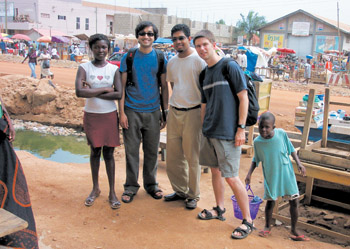 |
|
|
House work In an informal settlement outside Cape Town, South Africa, this past summer, third-year history concentrator Nick Juravich was taking pictures of dingy plywood and sheet-metal shelters when a group of children, intrigued by the camera, asked him to photograph them with their bikes. While the kids posed, two older men stepped in Juravich’s way and demanded to know what he was doing snapping pictures in their township. Slightly taken aback, he told them that he was working to help protect poor, internally displaced people—like those in the settlement—from the government’s heavy-handed evictions. The men immediately smiled and welcomed him.
“One shook my hand and said, ‘You’re doing right, then.’ It was an encouraging moment,” Juravich recalls. “Most South Africans were wary of me at first, particularly because of my obvious outsider characteristics, but when I explained what I was about and what I was doing, they often warmed up to me.” Connecting with people on a basic human level, regardless of socioeconomic or religious differences, is a guiding goal of the University’s Human Rights Program. Since its 1998 establishment, the program has placed more than 100 graduate and undergraduate summer interns in worldwide nongovernmental organizations (NGO), governmental agencies, and international groups, giving them field and administrative experience. This year 27 participants received $5,000 grants for activist work of their choice in places including the Philippines, Honduras, Israel, and Arizona to further the United Nations’ “Declaration of Human Rights” principle that “all human beings are born equal in dignity and rights...and should act towards one another in the spirit of brotherhood.” In Ghana, political science and law, letters, and society major Indivar Dutta-Gupta, ’05, discovered such a human connection by finding an unexpected ally. Also contesting forced evictions from informal settlements, particularly against women, Dutta-Gupta, an internship coordinator, spent his time in an Accra slum, made up mostly of northern Muslim refugees who escaped civil strife and were forced there by the government in 1990. “It’s what you would think,” he says. “It’s pretty dirty with a lot of trash and a very dense population.” Because this particular slum hides criminals and impedes an environmental restoration project, the Ghanese government has targeted it, evicting refugees but offering no relocation plan or compensation. But a local gang leader has stepped up to organize the residents, Dutta-Gupta says, seeming genuinely interested in their welfare despite being much better off. When a fire almost destroyed the settlement, the gang leader organized ad-hoc roadway construction so that water-carrying trucks could get to burning houses. “When a lot of people gave up on the political process he said, ‘We should stand up. We can’t give up,’” Dutta-Gupta recounts. Both he and Juravich interned for the Center for Housing Rights and Evictions (COHRE), which operates in the field and at the organizational and legislative levels. By researching and monitoring evictions COHRE responds to crises and rights violations through legal action, petitions, and NGO and church coalitions, pressuring governments to recognize victims. Despite some encouraging moments, they were both frustrated with how difficult it was to make progress. Government officials, uninterested in exposing their own countries’ rights violations, often would guard information on laws or not show up to work. When Dutta-Gupta tried to secure a copy of the Ghanese National Shelter Act, he says, “They would ask, ‘Why would you want a copy?’ and say, ‘I’ll just tell you what it is.’ I didn’t have any bargaining power. Maybe it was just a cultural difference. It was hard to make policy suggestions without knowing what the policy was.” Even human-rights allies were at times difficult to work with, he says, showing no clear sense of urgency. Still, they saw some positive signs. South Africa’s 1996 “transformative” constitution—which promotes a system of equality and flexibly reinterprets common law, as opposed to the U.S. Constitution’s focus on individual liberties and limited government—impressed Juravich, who says he hopes to help out there again. Human-rights efforts in general interest him as a future career. Dutta-Gupta, who received a Harry S. Truman Scholarship to intern in Washington, DC, next year—he hopes with USAID’s Africa bureau or a Defense peacekeeping office—marveled at the fact that uneducated, impoverished people who had never lived in a just society were aware of their own inherent dignity. “The people know they have rights and could articulate their sense of injustice: ‘Why is the government doing this to us?’” he says. “They were just hopeful. ‘This is a democracy, so they should listen to us.’ Hopefully one day it will be better.”—S.I.A. |
|
phone: 773/702-2163 | fax: 773/702-8836 | uchicago-magazine@uchicago.edu


